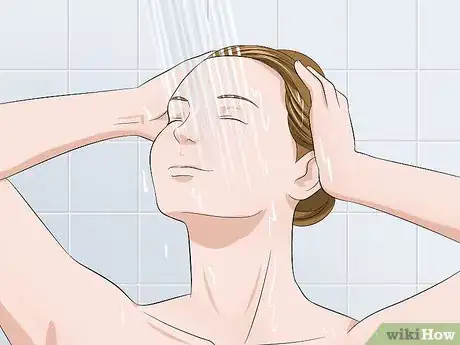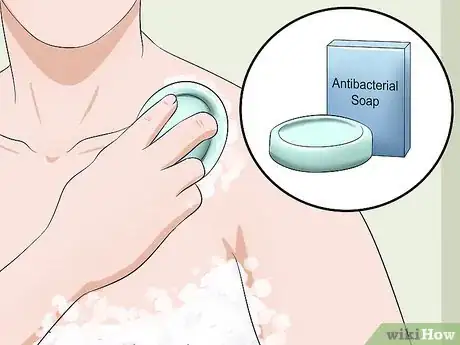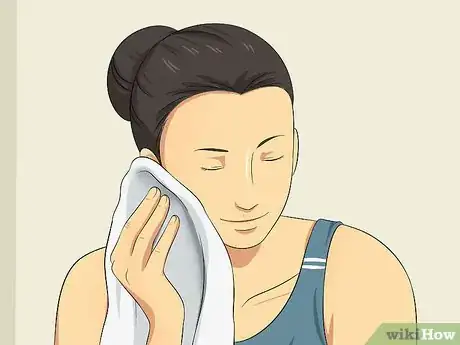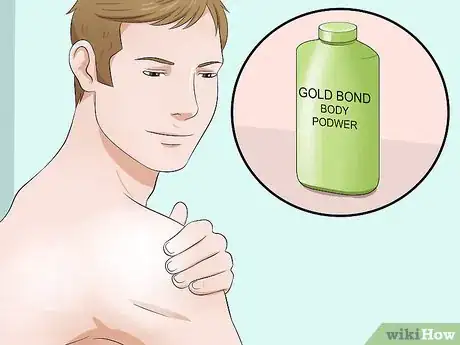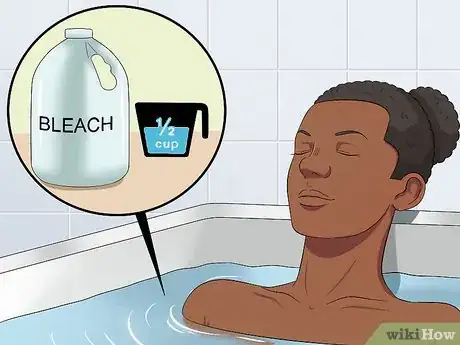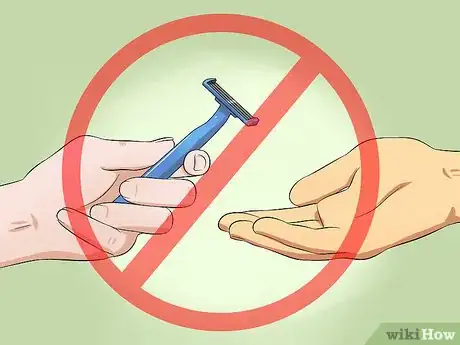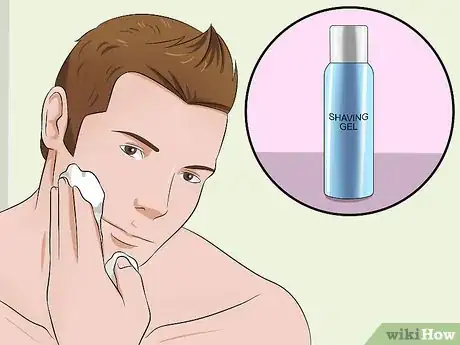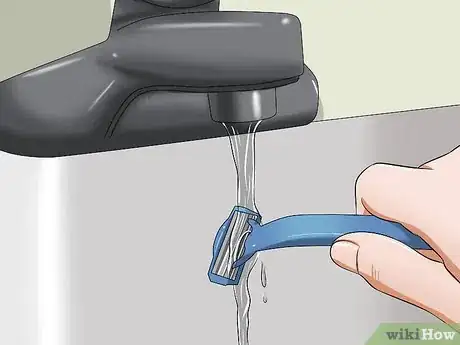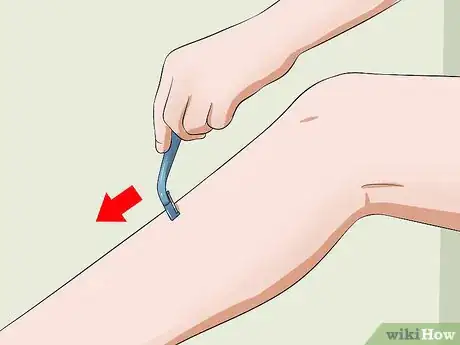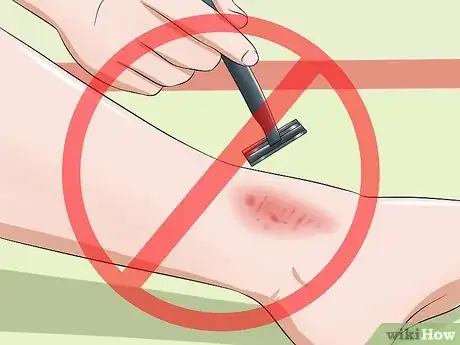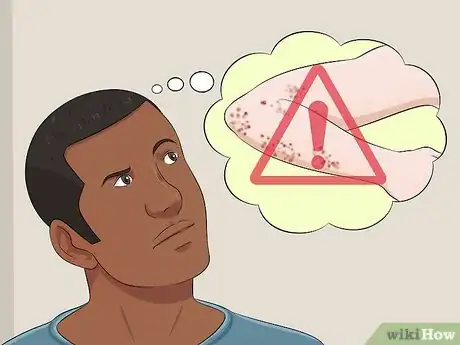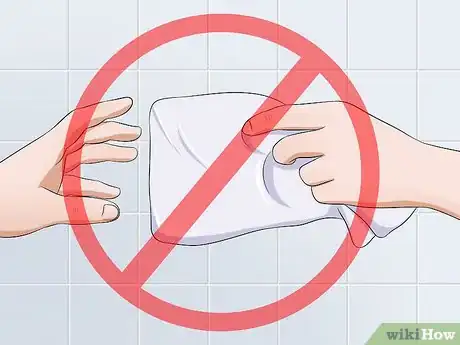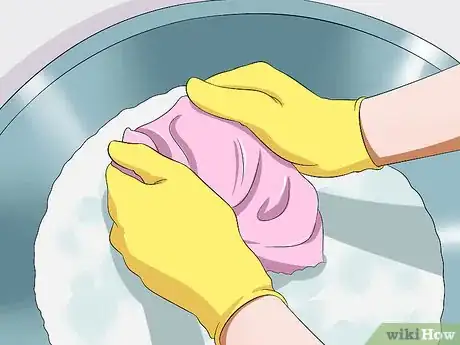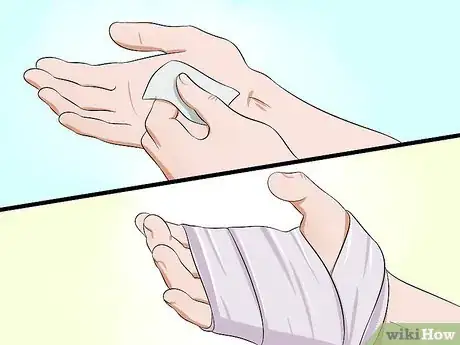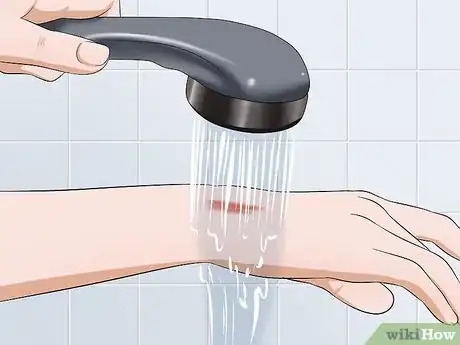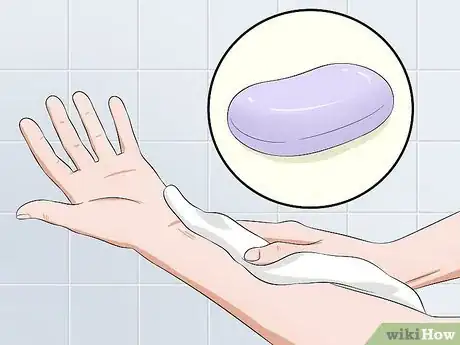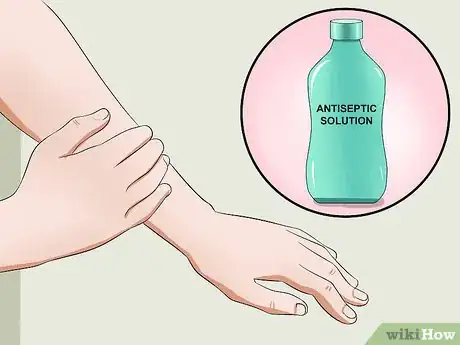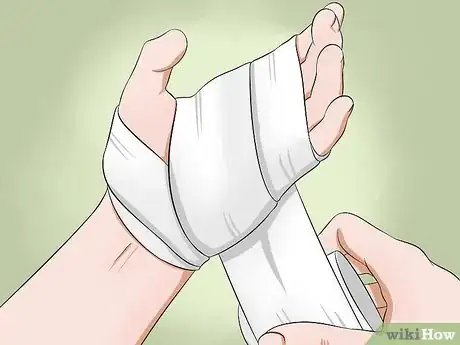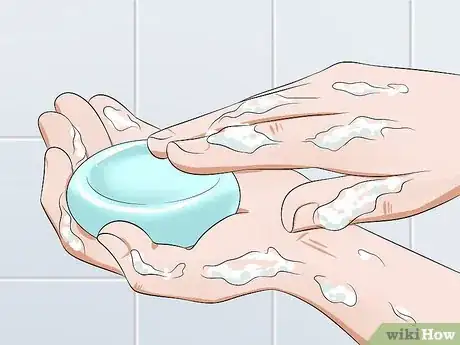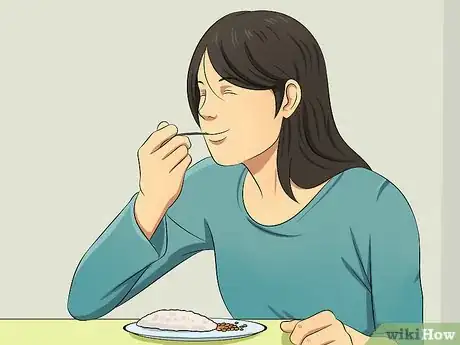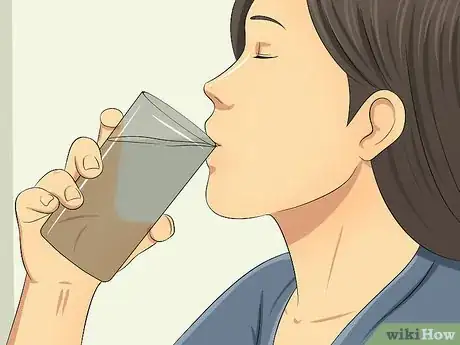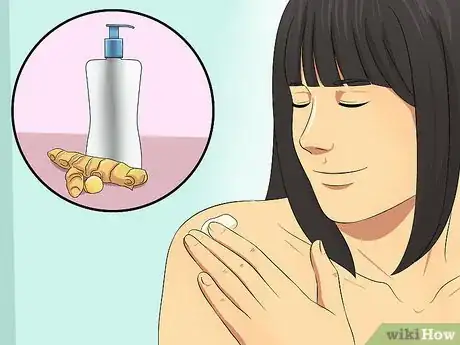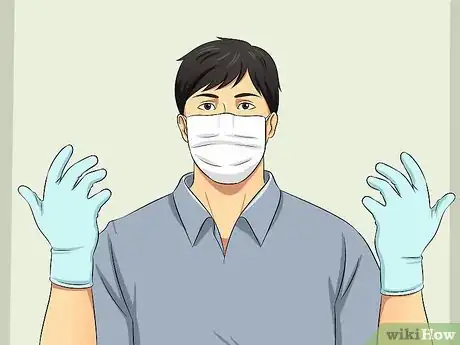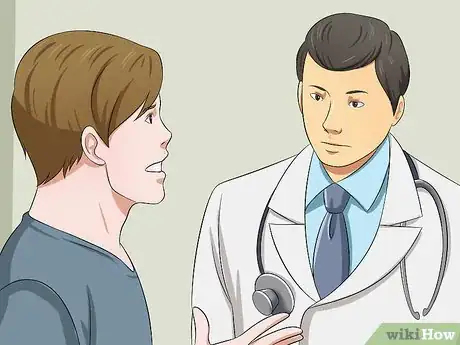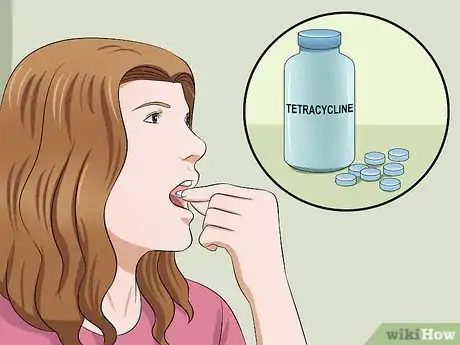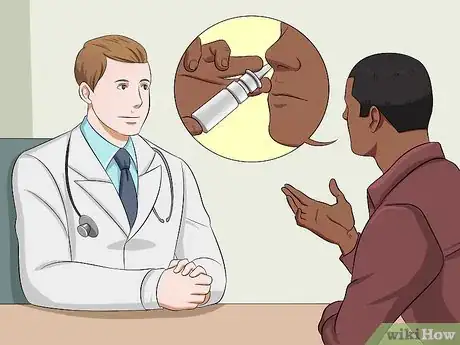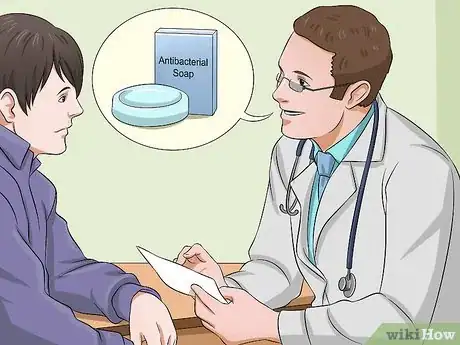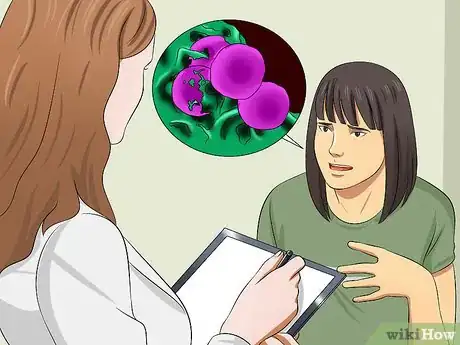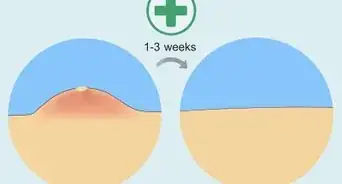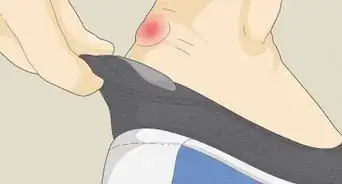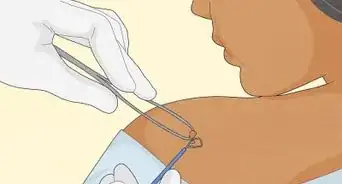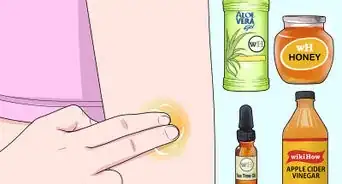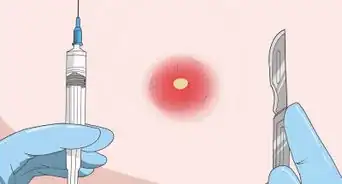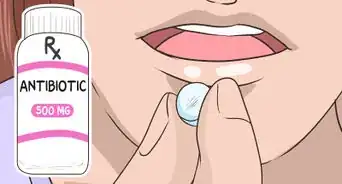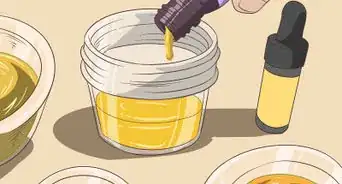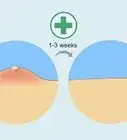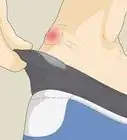This article was co-authored by Laura Marusinec, MD. Dr. Marusinec is a board certified Pediatrician at the Children's Hospital of Wisconsin, where she is on the Clinical Practice Council. She received her M.D. from the Medical College of Wisconsin School of Medicine in 1995 and completed her residency at the Medical College of Wisconsin in Pediatrics in 1998. She is a member of the American Medical Writers Association and the Society for Pediatric Urgent Care.
There are 33 references cited in this article, which can be found at the bottom of the page.
wikiHow marks an article as reader-approved once it receives enough positive feedback. This article received 13 testimonials and 89% of readers who voted found it helpful, earning it our reader-approved status.
This article has been viewed 344,156 times.
Boils are skin infections or abscesses that originate deep in your oil glands or hair follicles. Boils are unpleasant, but fortunately they can usually be prevented! A boil will normally begin to appear on your skin as a red spot, and eventually become a hard bump as it fills with pus.[1] Boils are caused by bacteria entering your skin through cuts or pores, and are more common in people with diabetes, compromised immune systems, certain skin conditions, and in some cases poor hygiene, and poor nutrition.[2] Cystic acne is a related condition that most commonly affects teenagers and can also lead to boils on the face, back and neck. Many of the same protocols for preventing boils will also help alleviate cystic acne.[3]
Steps
Practicing Good Hygiene
-
1Bathe or shower regularly to keep your skin and hair clean. Frequent bathing is especially important in hot weather when boils are more likely to form. Bathe or shower at least once a day, and after sweating. This will help prevent the Staphylococcus aureus (staph) bacteria that may be on your skin from getting into your pores or under your skin and starting a boil.[4]
- Pay special attention to areas where boils are most likely to form, including the face, neck, armpits, shoulders, and buttocks.[5]
-
2Use a mild antibacterial soap every day to eliminate bacteria on your skin. Look for a soap, body wash, or facial cleanser that says "antibacterial" on the label. There are many varieties available at your local grocery store or pharmacy.[6]
- If you find your antibacterial soap too drying, look for a gentle formulation like Cetaphil.
- Most antibacterial soaps use the active ingredient triclosan. For a natural alternative, look for a soap containing tea tree oil, a natural antibacterial agent.[7]
- In some cases, a prescription strength antibacterial soap may be needed. If you have ongoing problems with boils or other skin infections, ask your doctor about one of these.
- You can also try an acne body cleanser with benzoyl peroxide.
Advertisement -
3Gently exfoliate your skin using a loofah or washcloth. This will help prevent clogged pores that can lead to boils. Be careful not to scrub so hard that you damage your skin.
-
4Dry your skin thoroughly after bathing. Bacteria thrive in warm, damp environments so careful drying is important. You might also use baby powder, or a medicated powder like Gold Bond to help keep moisture-prone areas drier throughout the day.
-
5
-
6Wear clean, loose-fitting clothes. Avoid re-wearing clothes that you have sweated in. Wear loose-fitting clothes that will not rub against your skin and irritate it. Tight clothing will not allow your skin to breathe, which can cause irritation and leave you prone to boils.
Shaving to Avoid Boils
-
1Avoid sharing razors. The staph bacteria that causes boils can be spread by sharing personal items such as razors. Each person in your household who needs one should have their own razor.
-
2
-
3Keep your razors clean and sharp. Rinse your razor frequently as you shave. Replace disposable razors frequently, and keep other razors sharpened.[14] Sharp razors mean you have to apply less pressure to the skin to cut the hair, which reduces the likelihood of creating cuts and ingrown hairs.
-
4Shave “with the grain.” You may have been taught to shave in the opposite direction that your hair is growing, but that can cause ingrown hairs and lead to boils. Shave in the same direction as your hair grows.[15]
- This can be a little difficult to determine, especially if you have curly hair. In general, shave your legs in a downward motion. Run your hands along your skin to help you determine what direction your hair is growing.
-
5Think twice before shaving your genitals. Studies have shown serious infections of MRSA (methicillin-resistant Staphylococcus aureus) in women who shaved their pubic hair.[16] “Cosmetic body shaving” for men can also cause MRSA infections.[17] In general, it’s best to avoid shaving these sensitive areas.
- Shaving your genitals leaves your skin with small micro-wounds, through which the staph bacteria can enter and cause infection and boils. Because the area is usually sweatier than other areas of your body, the likelihood of boils developing is also higher.
-
6Do not shave an inflamed area. If you notice signs of inflammation or you see a boil, do not shave that area. You could end up spreading the bacteria and infection to other parts of your body.[18]
Preventing Infection from Others
-
1Take measures to avoid contagion. The staphylococcus aureus' bacteria that causes most boils is highly contagious. Staph infections spread easily through direct contact with infected skin or pus. If you are prone to these infections or have close contact with someone who is, you should use extra caution not to transmit bacteria.[19]
-
2Avoid sharing bedding, towels, wash cloths, or clothing with someone who suffers from boils or staph infections. Make sure all family members have their own towels and washcloths, wash them frequently, and keep them separate.
- The pus that comes out of a boil is highly infectious, and the bacteria can live on most surfaces for some time.
- Do not share bar soap if you have boils, or with someone who does have boils.
- You should also avoid sharing razors or sporting equipment. Both “regular” staph and MRSA can be spread by sharing personal items or sporting equipment.
-
3Wash and sanitize bedding and towels frequently and thoroughly to kill boil-causing bacteria. Use the hottest water recommended for the fabric you are washing, and use bleach on whites.
- Wear gloves when laundering the belongings of someone with boils as an extra precaution.
- If you are prone to boils on your face, you may want to change your pillowcase every day to prevent spreading the infection.
-
4Keep the wound clean and covered and change the dressing frequently. The pus that emerges from a boil is highly infectious and can cause more boils to form on yourself or others who may come in contact with it.
- Do not lance boils. If lancing is required it should be done by a medical professional. You could cause injury or further infection by doing this yourself.[20]
Treating Wounds Properly
-
1Clean all wounds thoroughly to prevent infection. Flush dirt and bacteria from a wound by placing the affected area under cool running water, or use a saline "wound wash" product available at most pharmacies and online retailers.[21]
-
2Use soap and a soft, damp, clean cloth to wash away dirt and bacteria from around the wound.
- If dirt remains in the wound after flushing it, remove it using sterile tweezers that have been cleaned with rubbing alcohol.
- If a wound is too large or deep to clean properly at home, or if you cannot remove all the debris, seek medical attention immediately.
-
3Apply an antiseptic solution or antibiotic ointment to your wound by following the directions provided by the manufacturer.
- There are natural alternatives to antiseptic solutions such as honey, as well as lavender, eucalyptus, and tea tree oil. These can be applied directly to the wound once or twice per day to kill bacteria.
-
4Cover the wound with a clean bandage, and change the dressing frequently. Wounds heal more quickly when they are covered. Bandaging also prevents dirt and foreign bacteria from entering the wound and making it worse.[22]
-
5Wash your hands thoroughly before and after treating a wound, and dispose of all bandages and dressings carefully. For optimal hand-washing, first wet your hands under running water, then apply soap. Lather well and rub hands together vigorously for at least 20 seconds, scrubbing all surfaces, including the backs of your hands, between your fingers, and under your finger nails. Rinse well, and then dry your hands thoroughly with a towel or aid dryer.[23]
Maintaining a Healthy Lifestyle
-
1Eat a healthy diet. Poor nutrition is one of the leading causes of immune deficiencies that lead to infection.[24] Make sure that you are getting not just adequate food, but healthy food that is rich in vitamins and minerals.
- Avoid foods that contain excess sugar, salt, and preservatives.
- Consider a vitamin supplement, especially one that contains Vitamin C.[25]
-
2Stay hydrated, especially in hot weather. Drinking plenty of water helps to keep pores clean and unclogged, which may help prevent boils. A good guideline for how much water you should drink every day is 1/2 to 1 ounce for every pound you weigh, so a person who weighs 150 pounds should aim to drink between 75 to 150 ounces (2.2 to 4.4 liters) per day.[26]
- If the weather is hot, or if you are doing strenuous work or exercise, aim for the upper end of the range.
-
3Try a daily dose of turmeric. The spice turmeric is a natural anti-inflammatory and antibacterial agent that may alleviate and prevent boils. A lotion or cream that contains turmeric may help your body heal wounds such as boils.[27] Although studies have not shown that consuming turmeric has any effect on boils, it is an antioxidant and may help prevent conditions such as heart attack and stroke, so feel free to cook with as much as you’d like.
-
4Get 20-30 minutes of exercise a day. A moderate amount of exercise has been shown to boost people's immune system considerably. Aim for at least 20 to 30 minutes of exercise a day to keep your skin healthy and prevent infection.[28]
- If you are new to exercise, start small. A 20 minute walk, or even two 10-minute walks a day are enough to see some improvement in immune function.
- Exercise doesn't have to be a chore, look for fun ways to be active, such as dancing or going to the park with your kids.
-
5Try to minimize stress. People who are under a great deal of stress are far more likely to develop boils and other physical ailments. Take some time every day to relax, if possible, and look for ways to reduce stress in your life. Exercise is great for stress, and many people find activities such as yoga, meditation, and tai chi to be beneficial.[29]
- Laughter is another great stress-fighter. Ask a friend to tell you a joke, or wind down by watching a funny comedy routine or TV show at the end of the day.[30]
-
6Avoid exposure to noxious chemicals. In some cases, boils are caused by exposure to irritating chemicals at home or on the job. Chemicals that are especially likely to cause skin problems include coal tar and cutting oils.[31] Use protective gear when working with these chemicals, and wash your skin thoroughly after exposure to remove them as soon as possible.
Seeking Medical Assistance to Help Prevent Boils
-
1See a doctor. If you are prone to frequent boils, or your boils do not go away with treatment, you should consult with a doctor to rule out any underlying conditions that may be causing your boils, such as undiagnosed diabetes, anemia or infection. Your doctor can also prescribe or recommend additional preventative measures. These could include oral antibiotics, topical treatments, and iron supplements.[32]
- You should also see a doctor if your boils return, if they last longer than 2 weeks, you develop a boil on your face or spine, the boil is painful, or you have a fever along with the boil.[33]
-
2Consider a course of oral antibiotics. Some people who suffer from frequent boils or cystic acne may require a course of oral antibiotics to eradicate any infections in the body that may be causing them.
- A six-month course of the antibiotics tetracycline, doxycycline, or erythromycin are most commonly prescribed to eliminate boils and problem acne.
-
3Ask your doctor about nasal antibiotics. Some people are unfortunately carriers of staph infections, which commonly live in the nose. If your doctor suspects you may be a carrier, she can give you an antibiotic cream or nasal spray to use daily for several days. This will help eliminate the staph colony in your nose and prevent the spread of infection to your own skin and to other people through sneezing, exhaling, etc.[34]
-
4Ask about prescription antibacterial soaps and topical treatments. If regular antibacterial soap is not helping or is bothering your skin, your doctor may be able to prescribe a more effective, or gentler alternative. Topical antibiotics can also be prescribed to apply to boil-prone areas, or open wounds.
-
5Talk to your doctor about MRSA. MRSA (methicillin-resistant Staphylococcus aureus) is a strain of staph that has become antibiotic-resistant, making it much harder to treat. It is often picked up in hospitals and other healthcare settings, such as nursing homes. However, it can also be spread by skin-to-skin contact, such as during sports activities.[35]
- Boils occur with MRSA infections. Other signs to look for include abscesses (collections of pus in your skin),[36] carbuncles (lumps that often contain pus and fluid),[37] and impetigo (thick, crusted boils that itch)[38] . If you think you may have a MRSA infection, see your doctor as soon as possible.
References
- ↑ http://www.emedicinehealth.com/boils/article_em.htm
- ↑ http://www.emedicinehealth.com/boils/article_em.htm
- ↑ http://www.webmd.com/skin-problems-and-treatments/cystic-acne
- ↑ http://www.emedicinehealth.com/boils/article_em.htm
- ↑ http://www.emedicinehealth.com/boils/article_em.htm
- ↑ http://answers.webmd.com/answers/1172618/what-can-be-done-to-prevent
- ↑ http://www.webmd.com/skin-problems-and-treatments/acne/features/tea-tree-oil-treats-skin-problems
- ↑ http://www.mayoclinic.org/diseases-conditions/eczema/expert-answers/eczema-bleach-bath/faq-20058413
- ↑ http://www.medscape.com/viewarticle/756817
- ↑ http://www.mayoclinic.org/diseases-conditions/eczema/expert-answers/eczema-bleach-bath/faq-20058413
- ↑ http://pediatrics.aappublications.org/content/123/5/e808.abstract
- ↑ http://www.webmd.com/skin-problems-and-treatments/guide/ingrown-hair-causes-symptoms-treatment
- ↑ http://www.webmd.com/skin-problems-and-treatments/guide/ingrown-hair-causes-symptoms-treatment?page=2
- ↑ http://kidshealth.org/teen/your_body/skin_stuff/shaving.html
- ↑ http://www.webmd.com/skin-problems-and-treatments/guide/ingrown-hair-causes-symptoms-treatment?page=2
- ↑ http://link.springer.com/article/10.1007/s11908-009-0067-6#page-1
- ↑ http://cid.oxfordjournals.org/content/39/10/1446.short
- ↑ http://www.medicinenet.com/script/main/mobileart.asp?articlekey=293&page=6
- ↑ http://www.nlm.nih.gov/medlineplus/staphylococcalinfections.html
- ↑ http://www.medicinenet.com/script/main/mobileart.asp?articlekey=293&page=6
- ↑ http://www.webmd.com/first-aid/how-to-clean-a-skin-wound
- ↑ http://www.palomarhealth.org/wound-care-centers/faqs
- ↑ http://www.mayoclinic.org/healthy-lifestyle/adult-health/in-depth/hand-washing/art-20046253
- ↑ http://cid.oxfordjournals.org/content/46/10/1582.full
- ↑ http://www.dermnetnz.org/bacterial/boils.html
- ↑ http://www.webmd.com/diet/water-for-weight-loss-diet?page=2
- ↑ http://www.ncbi.nlm.nih.gov/pubmed/25200875
- ↑ http://www.nlm.nih.gov/medlineplus/ency/article/007165.htm
- ↑ http://www.mayoclinic.org/healthy-lifestyle/stress-management/in-depth/stress-symptoms/art-20050987?pg=2
- ↑ http://www.mayoclinic.org/healthy-lifestyle/stress-management/in-depth/stress-relief/art-20044456
- ↑ http://www.dermnetnz.org/acne/folliculitis.html
- ↑ http://www.emedicinehealth.com/boils/page3_em.htm#boils_treatment
- ↑ http://www.nlm.nih.gov/medlineplus/ency/article/001474.htm
- ↑ http://www.nlm.nih.gov/medlineplus/druginfo/meds/a688004.html
- ↑ http://www.mayoclinic.org/diseases-conditions/mrsa/basics/definition/con-20024479
- ↑ http://www.nlm.nih.gov/medlineplus/abscess.html
- ↑ http://www.nlm.nih.gov/medlineplus/ency/article/000825.htm
- ↑ http://www.nlm.nih.gov/medlineplus/impetigo.html
About This Article
To prevent boils, keep your skin clean by showering at least once a day, or more often if you’ve been sweating. Make sure to focus on boil-prone areas, such as your face and neck, shoulders, armpits, and buttocks. For extra bacteria-fighting power, choose a mild antibacterial soap. You can also keep your pores clear by gently exfoliating with a washcloth or loofah. If your skin tends to get damp, stay dry and prevent bacterial buildup by using medicated powders and wearing loose, breathable clothing. For more tips from our Medical co-author, including how to avoid boils from shaving, read on!
